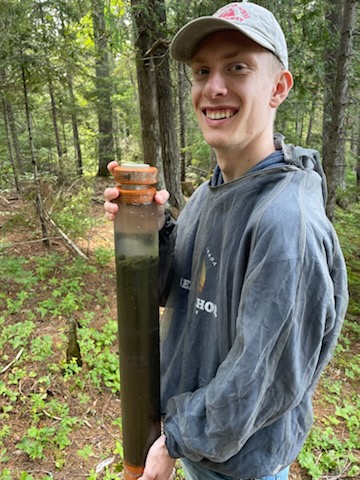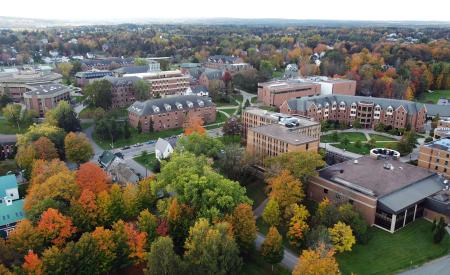Environmental science student William Chapman researches vibrio parahaemolyticus in oysters
William Chapman is a fourth-year environmental science honours student studying a species of bacteria called Vibrio parahaemolyticus (Vp), which is occasionally found in oysters.
The Canadian Food Inspection Agency (CFIA) regularly tests for Vp, and positive results for the bacteria are rare. The CFIA plays a key role in ensuring that unsafe products do not reach the public.
Supported by a Mount Allison Independent Student Research Grant (ISRG), Chapman’s research focuses on the Northumberland Strait and Malpeque Bay. Vp lives in the ocean and estuaries and shellfish pick up bacteria from their environment. Since oysters are often consumed raw, unlike clams and mussels that are usually cooked, they pose a higher risk to human health due to Vp.

Bacteria levels have been linked to rising temperature waters due to climate change. Once the bacteria show up in a location, it can be hard to get rid of posing a risk to fisherman in these locations.
“When a location fails a Vp test the facility is barred from selling oysters until tests show levels of bacteria have gone down,” says Chapman. “For some places, the highest levels of bacteria last throughout the summer with the warmest water temperatures, meaning they are closed during the busiest part of the year and losing out on valuable business.”
Little is known in this region about why, when, and where this bacterium appears and these are the questions Chapman’s research aims to answer.
“Given that water temperature has a big role, we’re also looking at projecting the state of this bacterium in the region as waters continue to warm 30 or 50 years down the line due to climate change.”
His research hypothesizes a relationship with water temperatures, suggesting that higher bacteria counts would correlate with higher temperatures. However, it is known that this is not the full answer.
Chapman’s data comes from CFIA, in cooperation with the Aquaculture Association of Nova Scotia (AANS) and he’s also been working with archival Vp test results for the last three years. Chapman also received data from Health Canada and using environmental data from National Oceans and Atmospheric Administration (NOAA) and Fisheries and Oceans Canada (DFO).
“To analyze all this, we have been trying to model with all sorts of established techniques and using those techniques in software like R and ArcGIS Pro to develop a good predictive model for Vp in the Atlantic Region," he says.
Chapman has long been interested in this research and the ISRG enabled him to devote his summer to the project.
“This is an important project to me, with impacts for both public health and the aquaculture industry in the Atlantic provinces. Having an ISRG to support this work means a lot.”
Dr. Josh Kurek, environmental science professor and Chapman’s advisor, encouraged him to pursue this research project.
“Understanding complex environmental problems, like how Vibrio responds to changing marine conditions, provides many benefits to a student researcher,” says Kurek. “For example, William gets to collaborate with government research scientists, discuss industry and policy challenges with expert stakeholders, and use different numerical approaches to recognize patterns in the data.”
Chapman’s advice to students interested in pursuing a research grant next summer is to go for it.
“I started looking into Vibrio as a personal project, but that gradually morphed into a wider project,” he says. “If there is something you are interested in, talk to a professor about it, because you never know where that will take you.”
Read more about Champan's research.
Chapman’s ISRG was funded by the NSERC Undergraduate Student Research Awards (USRA).




